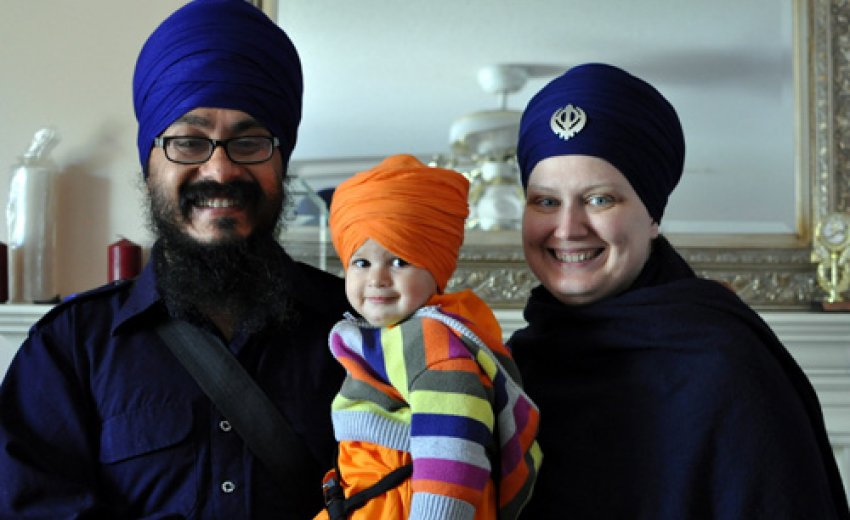
|
CNN PRODUCER NOTE jaskaur says she studied many different religions before she decided to convert to Sikhism. She took up the practices of Sikhs, like forgoing the consumption of alcohol and meats, abstaining from cutting her hair, and wearing the traditional Sikh headdress. She says when she wears a turban she is often mistaken for a Muslim. 'I've had both positive and negative experiences with this,' she said.
She says she often has to explain to people that she is Sikh and not Muslim. 'I don't mind explaining it to them. It's not a problem to educate people. I don't want people to think there's anything wrong with being Muslim, there's certainly not,' she explained. 'It's just that I want to be understood for who I am, rather than who I am not.'
Being a Sikh is a part of her identity. 'Whenever I see another Sikh it's like running into a long-lost family member. It's great, now I have a family all over the world,' she said. But she feels overwhelmed seeing her religion all over the media after the Sikh temple shooting. She says the shooting was a violation and she hopes people will learn about Sikhs from the tragic event. 'I kind of feel like it is my job to educate people, if they're interested.'
- Jareen, CNN iReport producer |
I am a Sikh woman. I'm also a white American. I became a Sikh after studying many religions, looking for the right fit. I chose the Sikh religion because it espouses all of the values I have been raised to believe are important as an American. Honesty; hard work; equality of race, class, and gender; tolerance of other faiths; charity; helping those in need; and standing up for the oppressed.
As an outsider, I met little resistance when I expressed my intention to convert, instead I was welcomed with open arms. After living the life of a Sikh for almost a year (no meat or alcohol, no removal of hair, daily prayer, and other major lifestyle changes), I participated in the ceremony of Amrit, or baptism into the faith. That was five years ago. Since then I have proudly worn the five articles of faith, including the kirpaan (small sword) and dastaar (turban). I have learned to read and write the Gurmukhi script so I can read the scriptures as they were written. I have married a Sikh man of Indian origin, and we have an amazing and beautiful daughter.
This tragedy has torn me apart. As a Sikh, I feel violated. I cannot believe someone could have so much anger, so much hate, as to walk into our place of worship and murder innocent strangers. I feel like my heart is breaking. As Sikhs, we call each other brother and sister, aunt and uncle, even to those we've never met. I feel like someone walked into my living room and opened fire.
But I'm also white. Just like the terrorist. And I've watched in dismay as some Sikhs (mostly outside the US) in their pain have pointed fingers at white Americans as ignorant racists. And I pray that in their hurt and shock, it was only a fleeting feeling. Because most Americans are not terrorists. Most Americans do not walk into a house of worship and murder innocent people.
As a convert to the faith, I feel like I should always be an ambassador. Sikhs want to know why I chose to become a Sikh. Why I chose to wear a turban, to be a potential target. Because it's the perfect faith for me, and that matters more than a few misguided insults. People outside the Sikh community seem comfortable asking me questions about my unique appearance, the turban on my head, the iron bangle on my wrist, the small sword at my side. Nearly all of them assume I'm Muslim. I explain that no, I'm a Sikh. Not that there's anything wrong with being Muslim, I always add. I always wonder why that must be said. Why I have to be defined by who I am not. I'd rather be asked who I am. I am a Sikh. An American. A human being. Just like you.

